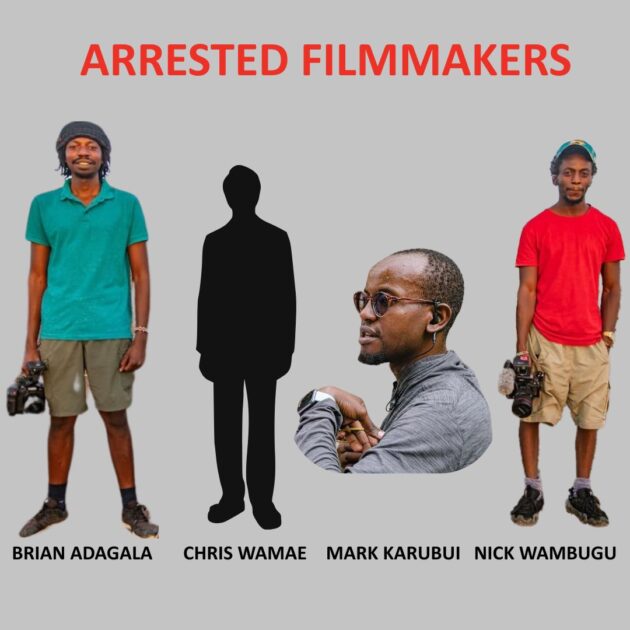
Kenya Film Association Condemns Arrest of Filmmakers Behind Damning Protest Documentary » Capital News
NAIROBI, Kenya May 3 – The Kenya Film and Television Professionals Association (KFPTA) has sharply condemned the arrest of four young Kenyan filmmakers, calling it a blatant attack on creative freedom and the right to free expression.
In a strongly worded statement, KFPTA demanded the immediate and unconditional release of the filmmakers, who were arrested by police following the release of a documentary that scrutinizes the deadly anti-tax protests of June 25, 2024.
According to KFPTA Chairperson Ezekiel Onyango, filmmakers Nicholas Wambugu and Brian Adagala are currently being held at Pangani Police Station, while MarkDenver Karubiu and Christopher Wamae are detained at Muthaiga Police Station.
“We have been granted access to visit them tomorrow morning (Saturday), and we will provide further updates regarding their condition and the circumstances of their arrest,” Onyango stated.
Police are reportedly preparing to charge the four with offenses related to publishing false information and cyberbullying a move that the association says threatens to criminalize artistic expression.
Onyango demanded full transparency regarding the charges and the conditions under which the filmmakers are being held. He also pledged that the association would offer legal and institutional support to the detainees.
“We stand in full solidarity with our arrested colleagues, their families, and the broader creative community.The criminalisation of filmmakers for their work is unacceptable. We urge the public and our fellow creatives to remain calm, vigilant, and supportive as we pursue justice,”he said.
The arrests come in the wake of a controversial documentary ‘Blood Parliament in Kenya’produced by the filmmakers, which sheds light on the deadly police crackdown during last year’s anti-tax demonstrations. The film identifies specific police officers seen shooting at protesters near Parliament on June 25, 2024.
The documentary, which was scheduled for community screenings, faced resistance from authorities. One such screening was recently blocked, sparking public outrage and renewed scrutiny of state censorship.
The damning documentary details the June 25, 2024 anti-tax protests that ended in bloodshed, identifying some of the police officers who shot or seen shooting three protesters outside the Kenyan Parliament.
The filmmakers were arrested from their studio in Karen on Friday night and booked in separate police stations, according to activists tracking the arrests.
“The police have arrested three filmmakers, Nicholas Wambugu, Brian Adagala, MarkDenver Karubiu, and Chris Wamae at their offices at Karen Village. The police confiscated their equipment, and hard drives,” Boniface Mwangi tweeted shortly after the arrest.
Lawyer and Human Rights activist Hussein Khalid of Vocal Africa too said “the filmmakers were being held in Pangani and Muthaiga Police Stations.” “It seems this government has panicked and is making school kid mistakes. They are inviting people back to the streets.”
Police have not commented on the arrests. When the documentary was released last week, a planned community screening was blocked, sparking public outrage.
The BBC report singled out police officers believed to have killed three protestors after analysing over 5,000 images to piece together the sequence of events on June 25, 2024.
Members of Parliament condemned BBC for the documentary, with some saying the broadcaster was pushing a foreign agenda. “BBC is funded by taxpayers’ money in Britain, meaning that it is funded to push the foreign agenda internationally. We want to know if the BBC is speaking as a mouthpiece of the government and the people of Britain or what it is doing,” said Dagoreti MP John Kiarie.
Kiarie claimed the BBC documentary is out to arm-twist the Kenyan government to rescind the condition placed by parliament that the British Army soldiers who commit crimes in the country must be charged locally.
“Could it be an attempt to arm-twist this country so that they can rescind the rider that we put on the training of BATUK units in Kenya and perpetuate a history of extractive economy, oppressive and exploitative economy in an unfair trade balance between Kenya and the UK?”, he’d said.
But others lawmakers like Millie Odhiambo of Suba North constituency called for thorough investigations and said the government should not seek to gag the press.
“I think we have not handled the issue well, and that is why people are coming from outside to document the events of that day. We do not need the BBC to tell us that something is wrong. We have a very angry young generation and we cannot bury our heads in the sand,” she said.
“We think we are moving on but there are many young people who have not necessarily moved on. I appeal that we set up a select committee to deal with the the after effect of the Finance Bill 2024.”
“A screening of BBC Africa Eye’s ‘Blood Parliament in Kenya’ was cancelled due to pressure from the authorities,” a BBC spokesperson said.
The documentary also renewed calls for the arrest of the police officers behind the brutality witnessed during the protests.